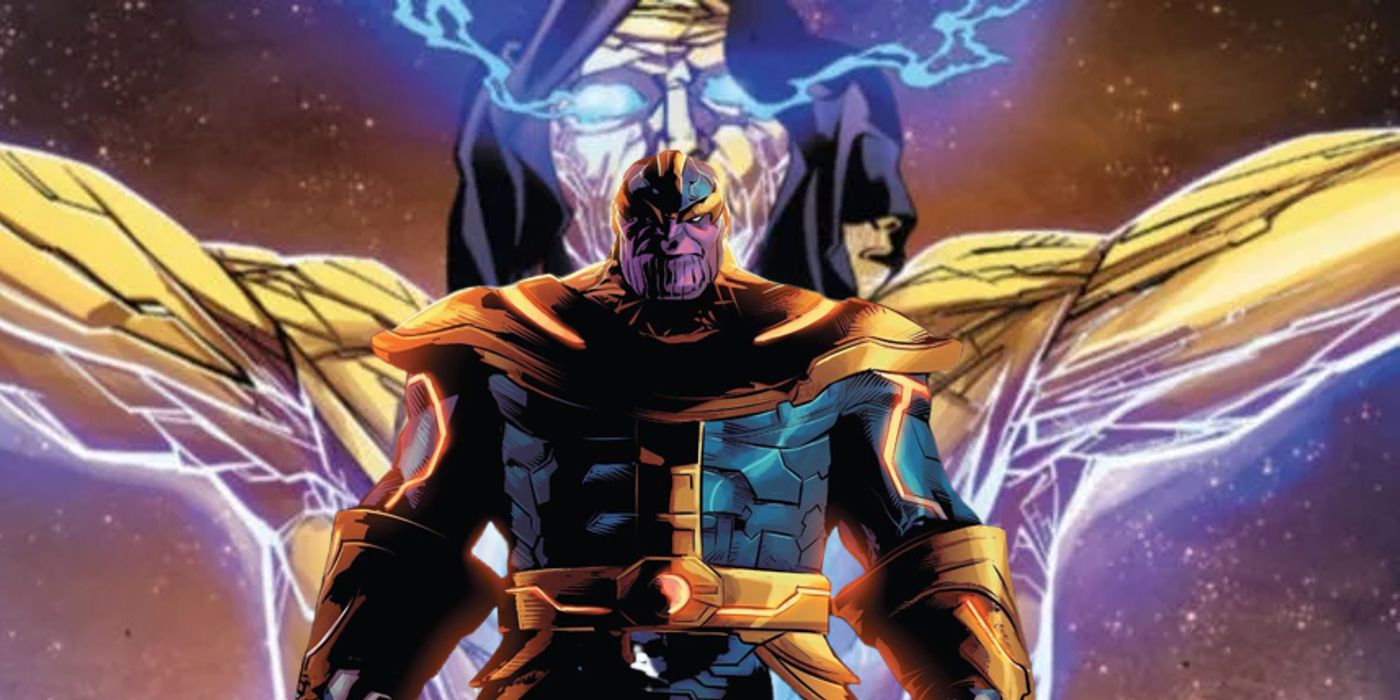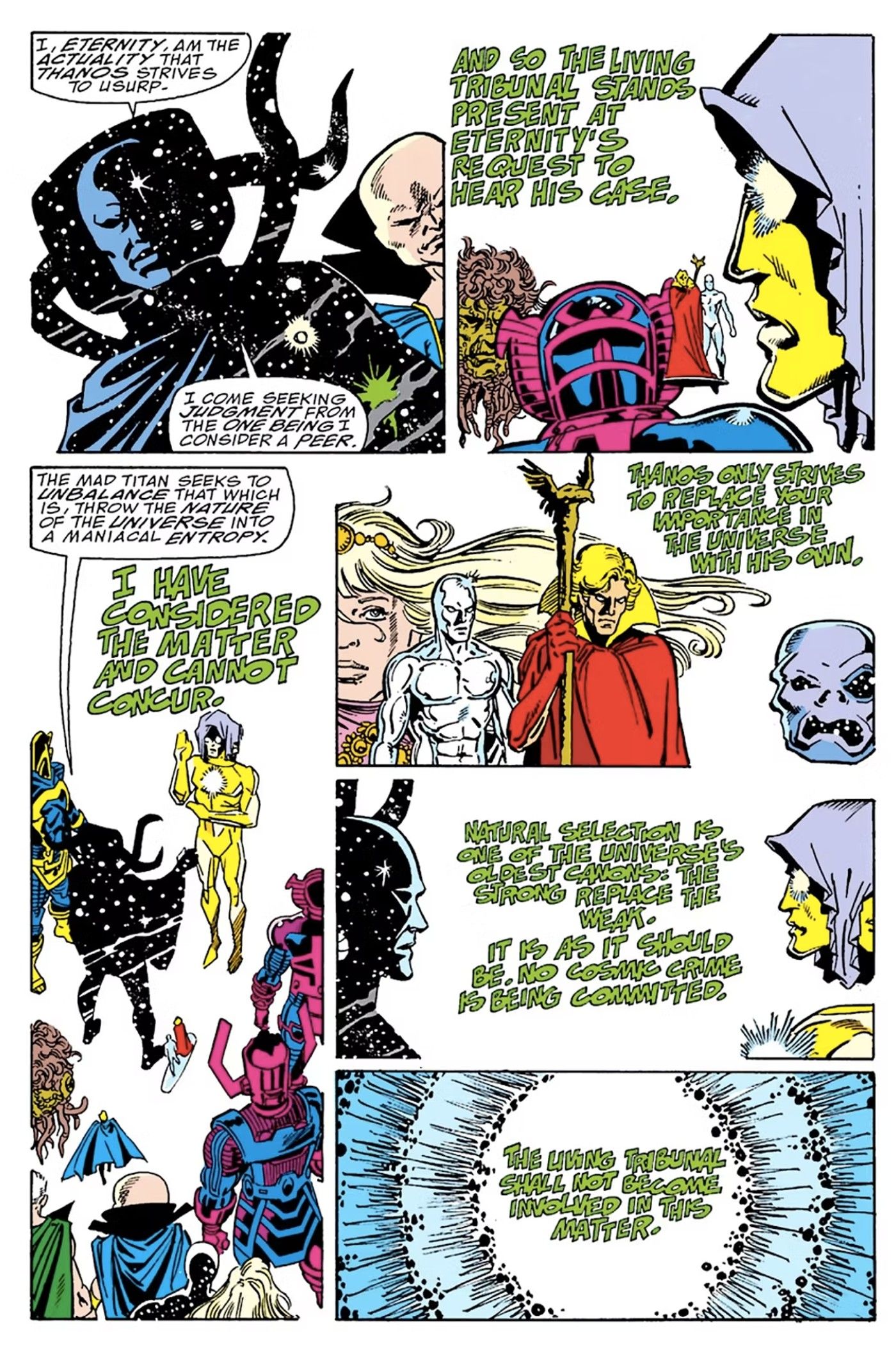Thanos’ snap in The Infinity Gauntlet threatened the entire order of the Marvel Universe, but one of the entire multiverse’s greatest powers actually had no problem whatsoever with his actions. If morality isn’t a concern, then as long as Thanos doesn’t literally destroy all reality, it doesn’t matter if he’s in control of it.
In the Marvel cosmology, there are many beings who personify the concepts that make up the universe itself. Chief among these beings is Eternity who, along with his counterpart Infinity, embodies the whole of the Marvel Universe itself and has full control of reality. The only authority that beings like Eternity seem to respect is the Living Tribunal, itself the embodiment of law and thus order in the multiverse. The Living Tribunal’s power stems from the One Above All, the ultimate god of the entire multiverse. The Living Tribunal acts as judge for the most serious matters in the entire multiverse, most famously when Thanos’ threatened the universe using the combined Infinity Gems during the event The Infinity Gauntlet.
Thanos Is Essentially A Force Of Nature
What’s fascinating is that the Living Tribunal sees no problem with Thanos’ actions during The Infinity Gauntlet. In Jim Starlin and George Pérez The Infinity Gauntlet #3, the most significant of Marvel’s cosmic beings gather to debate what’s to be done about Thanos’ reign of terror after he uses the combined Infinity Gems to erase half the population of the universe. Eternity petitions the Living Tribunal, arguing that Thanos’ actions put all of existence in danger. However, the Tribunal disagrees, saying, "Thanos only strives to replace your importance in the universe with his own. Natural selection is one of the universe's oldest canons. The strong replace the weak—No cosmic crime is being committed." Thanos in the event seeks to curry favor with the personification of Death, and the Tribunal doesn’t see a problem here. Thanos might become the supreme embodiment of Eternity in the process, which he does in The Infinity Gauntlet #5 by Starlin and Ron Lim, but for the Tribunal, it makes no difference who’s in charge of Marvel's cosmic heirarchy.
Eternity as a concept is akin to a force of nature. Marvel cosmology has proven again and again that these concepts need to exist. It’s interesting that the Living Tribunal doesn’t see a distinction between Eternity who, as far as readers know, was literally created as this embodiment, and Thanos, who seeks to usurp the role. However, for a being above morality like the Tribunal, this is a distinction without a difference. That Eternity even brings the matter forward shows that he, like Thanos, has self-preservation, self-interest, and an opinion on how the universe "should be." But the Living Tribunal's only care is the continued existence of the universe in its "natural order," so to him there’s no problem.
The Tribunal’s ruling is complicated by his later judgment of Adam Warlock over the same concerns. In Jim Starlin and Angel Medina’s Warlock and the Infinity Watch #1, Eternity argues that Adam Warlock shouldn’t control the Infinity Gems. The Living Tribunal concurs, decreeing that Adam possessing the Gauntlet could literally end the universe, since Adam has been rash and illogical in the past. It’s fascinating that such a possibility isn’t seen as a problem with Thanos. Does the Living Tribunal possess the ability to see the future? Or is Thanos simply predictable, while Adam is only predictable in his unpredictability? Is there a difference? Either way, the Living Tribunal might have no problem with Thanos’ reign of terror, but it seems that some possibilities are even too dangerous for the Marvel Universe’s multiversal judge.


